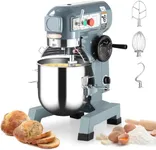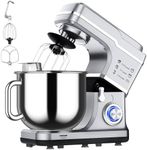Buying Guide for the Best Dough Mixers
Choosing the right dough mixer can make a significant difference in your baking experience, whether you're a home baker or a professional. The right mixer will save you time, effort, and ensure consistent results. When selecting a dough mixer, consider the following key specifications to find the best fit for your needs.CapacityCapacity refers to the amount of dough a mixer can handle at one time. This is important because it determines how much you can bake in a single batch. Mixers come in various capacities, typically measured in quarts or liters. Small mixers (up to 5 quarts) are suitable for home bakers who make small batches. Medium mixers (5-10 quarts) are ideal for those who bake more frequently or in larger quantities. Large mixers (10+ quarts) are best for professional bakers or those who bake in bulk. Choose a capacity that matches your baking volume to avoid overloading the mixer or having to make multiple batches.
PowerPower is measured in watts and indicates the strength of the mixer's motor. This is crucial because a more powerful motor can handle heavier doughs and larger quantities without straining. Mixers with lower power (200-400 watts) are suitable for light doughs and occasional use. Medium power mixers (400-800 watts) can handle most home baking needs, including bread dough. High power mixers (800+ watts) are designed for heavy-duty use and professional settings. Consider the types of dough you will be mixing and choose a power level that can handle your requirements without overheating or breaking down.
Speed SettingsSpeed settings allow you to control the mixing process, which is important for achieving the right consistency for different types of dough. Mixers typically come with multiple speed settings, ranging from low to high. Low speeds are ideal for initial mixing and kneading, while higher speeds are used for whipping and incorporating air. Basic mixers may have 3-5 speed settings, which are sufficient for most home baking tasks. More advanced mixers can have 10 or more settings, offering greater precision and versatility. Choose a mixer with enough speed options to accommodate the variety of recipes you plan to make.
AttachmentsAttachments are additional tools that come with the mixer, such as dough hooks, beaters, and whisks. These are important because they expand the functionality of the mixer, allowing you to perform different tasks. Dough hooks are essential for kneading bread dough, beaters are used for mixing batters, and whisks are for whipping cream or egg whites. Some mixers also offer optional attachments like pasta makers or meat grinders. Consider the types of baking and cooking you do and choose a mixer that includes the attachments you need or has the option to add them later.
Build QualityBuild quality refers to the materials and construction of the mixer. This is important because a well-built mixer will be more durable and reliable. Mixers can be made from plastic, metal, or a combination of both. Plastic mixers are lighter and often less expensive, but may not be as durable. Metal mixers are sturdier and can handle more heavy-duty use, but they are also heavier and more expensive. Look for a mixer with a solid build, preferably with metal components, especially for the gears and motor housing. This will ensure longevity and consistent performance.
Ease of CleaningEase of cleaning is an important consideration because it affects how much time and effort you will spend maintaining your mixer. Mixers with removable parts that are dishwasher safe are the easiest to clean. Look for mixers with smooth surfaces and minimal crevices where dough can get stuck. Some mixers also have splash guards to prevent messes during mixing. Consider how often you will use the mixer and choose one that is easy to clean to make your baking experience more enjoyable and less time-consuming.
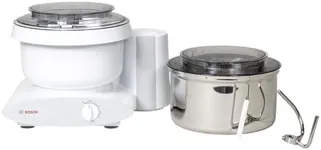


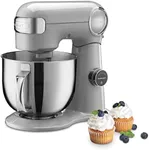
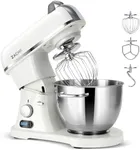
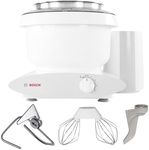
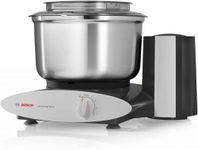
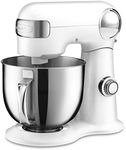
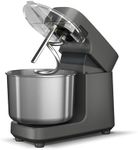

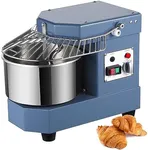

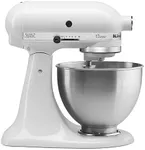
![Neretva Stand Mixer, [6.34QT& 6-Speed& 400W] Mixers Kitchen Electric Stand Mixer Lightweight& Large Capacity& LED Display Kitchen Mixer with Whisk, Flat Beater, Dough Hook](https://images-proxy.bestreviews.guide/xIiv9G7II8d4XYwdaR78j6E1F0A=/0x150/https://m.media-amazon.com/images/I/41AwGK5iS5L._AC_CX679_.jpg)
